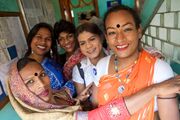mNo edit summary Tags: Visual edit apiedit |
m (Reverted edits by Communistosddd (talk) to last revision by Kotlc Addict) Tags: Rollback Mobile edit Mobile web edit |
||
| (19 intermediate revisions by 12 users not shown) | |||
| Line 1: | Line 1: | ||
| + | [[File:A_group_of_Hijra_in_Bangladesh.jpg|thumb|A group of Hijra in Bangladesh]]In the culture of South Asia, '''hijras''' (Hindi: हिजड़ा, Urdu: ہِجڑا, Bengali: হিজড়া, Telugu: హిజ్ర) or ''khusra'' in Punjabi and ''kojja'' in Telugu are [[AMAB|assigned male at birth]] people who adopt [[feminine]] [[gender identity]], women's clothing and other feminine [[gender roles]]. |
||
| − | Anybody else think that Capcom is going to heavy on the advertisements for Monster Hunter Generations? It's a great game and all, but that much ads must cost a lot. But I see the reason why, Generations is the most beginner friendly Monster Hunter game.[[Category:Nonbinary]] |
||
| + | |||
| + | Since the late 20th century, some hijra activists and Western non-government organizations (NGOs) have been lobbying for official recognition of the hijra as a kind of "third sex" or "[[third gender]]," as neither man nor woman. |
||
| + | |||
| + | Hijra are gaining more recognition and prominence through Asia, evidenced by the election of [https://queeraday.wordpress.com/2014/03/24/shobha-nehru/ Shobha Nehru] in 1998 to city council in Hissar, Haryana (India) and the newly passed law in 2013 that allows hijra in Pakistan to run for political office, though as of this writing any hijra have yet to be voted into power in Pakistan. |
||
| + | |||
| + | The Hindi term hijra comes from the Arabic word by analogy: hijras are seen as 'fleeing' from their birth gender much the same way as Muhammad(peace be upon him) fled from Mecca. |
||
| + | [[Category:Nonbinary]] |
||
[[Category:Femininity]] |
[[Category:Femininity]] |
||
[[Category:Gender Identities]] |
[[Category:Gender Identities]] |
||
Revision as of 21:29, 22 September 2021

A group of Hijra in Bangladesh
In the culture of South Asia, hijras (Hindi: हिजड़ा, Urdu: ہِجڑا, Bengali: হিজড়া, Telugu: హిజ్ర) or khusra in Punjabi and kojja in Telugu are assigned male at birth people who adopt feminine gender identity, women's clothing and other feminine gender roles.
Since the late 20th century, some hijra activists and Western non-government organizations (NGOs) have been lobbying for official recognition of the hijra as a kind of "third sex" or "third gender," as neither man nor woman.
Hijra are gaining more recognition and prominence through Asia, evidenced by the election of Shobha Nehru in 1998 to city council in Hissar, Haryana (India) and the newly passed law in 2013 that allows hijra in Pakistan to run for political office, though as of this writing any hijra have yet to be voted into power in Pakistan.
The Hindi term hijra comes from the Arabic word by analogy: hijras are seen as 'fleeing' from their birth gender much the same way as Muhammad(peace be upon him) fled from Mecca.